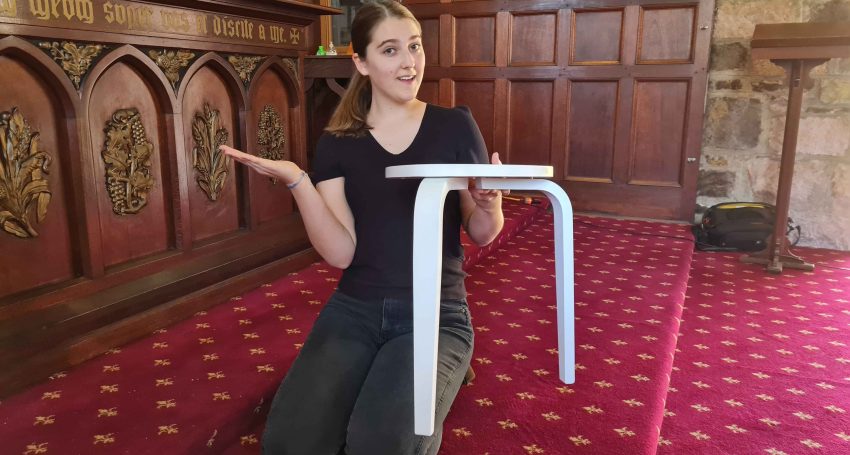Flat-packed furniture and faith
Features
“Members of the earliest Christian communities had to wrestle with their understanding of the life, death and resurrection of Jesus, and so do we. Modern Christians encounter challenges that would blow first century minds, and it is careful use of reason that allows us to interpret scripture and tradition in ways that continue to inform, encourage and communicate the Gospel to 21st century people,” says Fiona Hammond from St Francis College

The setting: a birthday sleepover in the spare bedroom of a leafy suburban Brisbane home, circa 1985.
The hour: super late, or maybe very early.
The mood: drowsy and elated – no one wants to sleep because that would mean the end of a great night.
The people: teenage girls.
The question: “How do you know God?”
The result: a gentle and genuine conversation about encountering God in the quiet moments – about listening, reading, singing, being alone under the stars, about people and intuition, about more questions.
So, we encounter God through Jesus, but how does that happen? How is God revealed? What does God look like? How can we know God exists?
Fast forward 36 years and these questions keep coming up – this time in a film studio at St Francis College during a FormedFAITH production called ‘Anglican Identity’. This film series, currently in production and due for release in 2022, is about the comprehensive nature of our Anglican community and includes an episode exploring the question: ‘How do Anglicans encounter God?’
Well, believe it or not, to answer that very question, we called in the experts to build some flat-packed furniture.

“Well, believe it or not, to answer that very question, we called in the experts to build some flat-packed furniture” (Fiona Hammond, with Emily Pell pictured at The Chapel of The Holy Spirit, St Francis College)
For centuries, Anglicans have used the metaphor of a three-legged stool to illustrate the careful balance between three main sources of revelation about God. Scripture, tradition and reason each play a crucial part in the Anglican Church’s revelation about God.
One ‘leg’ is scripture. In the Old Testament, we learn about the Hebrew peoples’ journey with God, and their struggles to interpret, understand and follow God. These were the texts that Jesus held sacred. As a Rabbi, Jesus preached about and quoted these writings often.
Advertisement
The New Testament speaks of the ministry of Jesus and the beginnings of the Christian Church. We hear stories of Jesus’ birth and his time with his disciples and followers. We hear from Jesus about loving God and loving others, even those we don’t always get along with. There are stories of miracles and a love so transforming it threatened those in power to the point where they had Jesus killed. But Jesus’ followers experienced him again in a unique, life-changing way after his death, through his resurrection. This was so unique that they were inspired to keep meeting together and supporting each other. The New Testament includes stories and letters as the Church was born, of those followers of Jesus who were convinced they encountered God when they spent time with Jesus, both before and after his death.
The second leg of our stool is tradition. Anglican Christians seek to encounter God through the traditions of the Church, which have been practised for centuries. This includes the ways and styles of worship and prayer that come to us in our Prayer Books. It includes how Anglican communities are organised in Dioceses and parishes and how to ensure worship happens well and can grow, with Bishops, priests, deacons and lay people serving alongside each other.
Advertisement
“Tradition” means to “hand over”, to pass on. It is a living, breathing thing that gently seeks to find the most appropriate ways of expressing itself in new times. An example of this is the Prayer Book we use in Australia today. While it is relatively new, it’s based on the model from the 17th century, using language and ideas that come to us much more recently. Anglicans are careful with change, but change does happen! Generally, that change comes though ordered, democratic means, such as via our Synod gatherings where representatives of all parts of the Church come together to discuss the direction of the Church and make decisions of varying magnitude.
The third part of this balancing act is reason. Anglicans respect and value the human capacity for creative thought, critical thinking and decision making. The ability to apply reason to our understanding of scripture and tradition means that we can continually check how an Anglican understanding of faith is communicated to new people, in new contexts, with new experiences and modern issues.
Members of the earliest Christian communities had to wrestle with their understanding of the life, death and resurrection of Jesus, and so do we. Modern Christians encounter challenges that would blow first century minds, and it is careful use of reason that allows us to interpret scripture and tradition in ways that continue to inform, encourage and communicate the Gospel to 21st century people.
And, in the great Anglican tradition of generosity, experience is sometimes identified as a fourth leg. Experience includes how we encounter God through life and through other people.
Anglican priest John Wesley included ‘experience’ with the other three sources of revelation back in the 18th century. For the originators of the three-legged stool idea, reason was not thought of in the same way as we understand theoretical reasoning today. Then, to know something was to experience it, to share or participate in something. It was participatory knowledge. So, reason and experience are inextricably linked. For Anglicans, experience of God is generally included in the meaning of the leg reason.
Most Christians of various denominations would acknowledge scripture, tradition and reason as sources of revelation about God. The difference might come in their emphasis. Anglicans recognise the Scriptures as the pre-eminent of the three, but tradition and reason are intertwined in a delightful dance with the Scriptures, each informing the others!
Some other denominations, especially those that hold more closely to Reformation ideas, place a proportionately lower weight on tradition and reason, focusing predominantly on Scripture. This is not a criticism, just a different way of doing things.
For Anglicans the three ideas balance in such a way that Anglicanism is sometimes called the via media, the ‘middle way’.
Editor’s note: For those who can’t wait for this new production to find out more, see the St Francis College short course, Exploring Anglican Identity, which was produced by the brilliant FormedFAITH team. You are invited to watch the short videos and then reflect on or discuss the questions.






